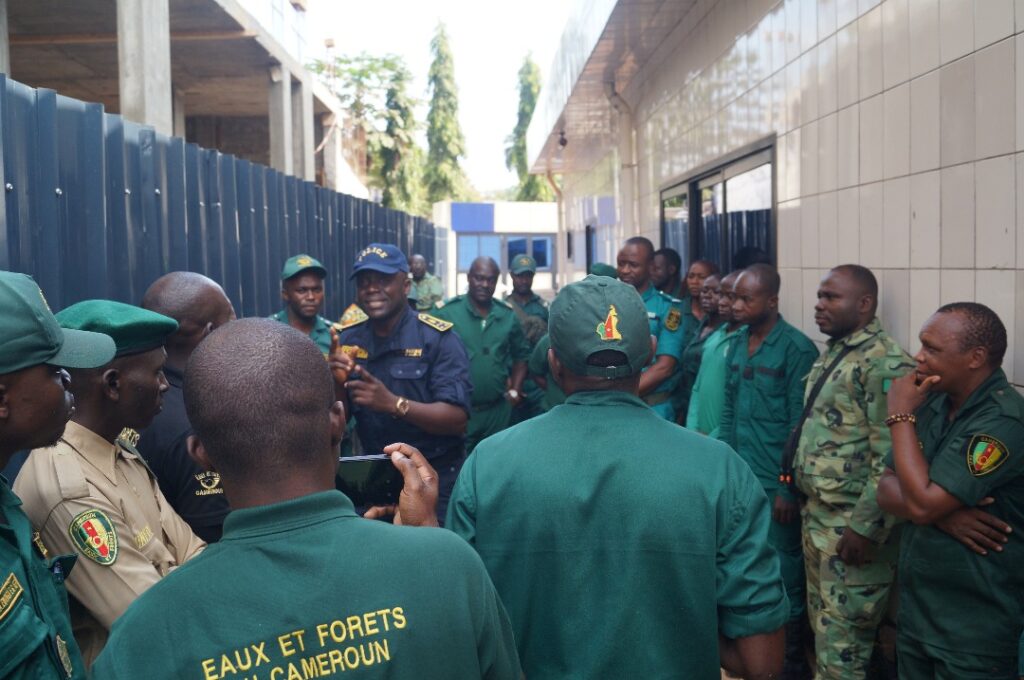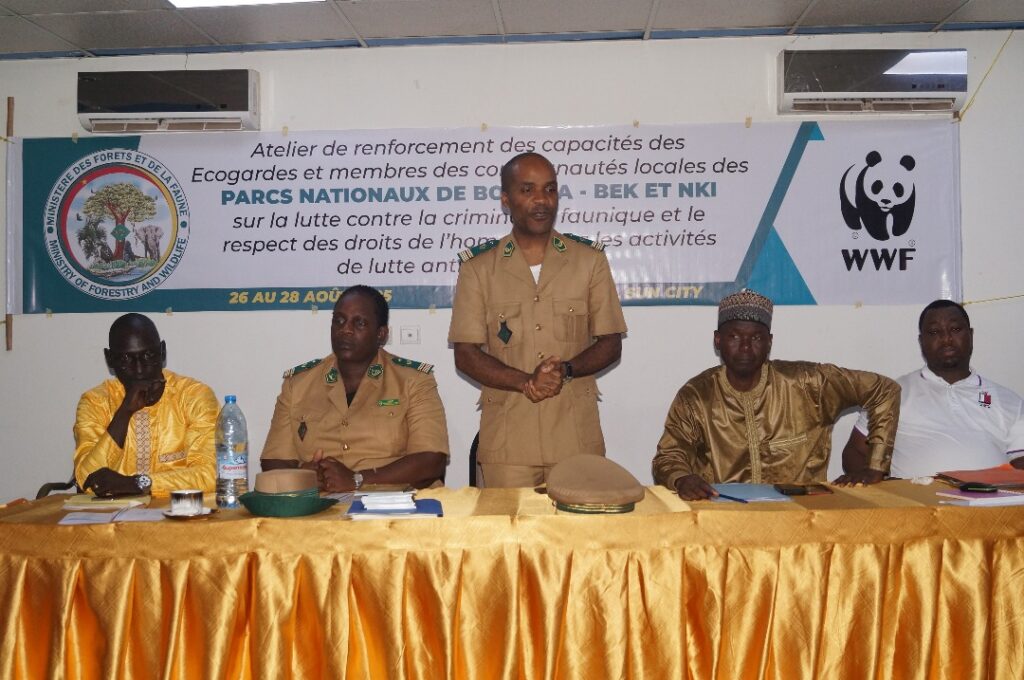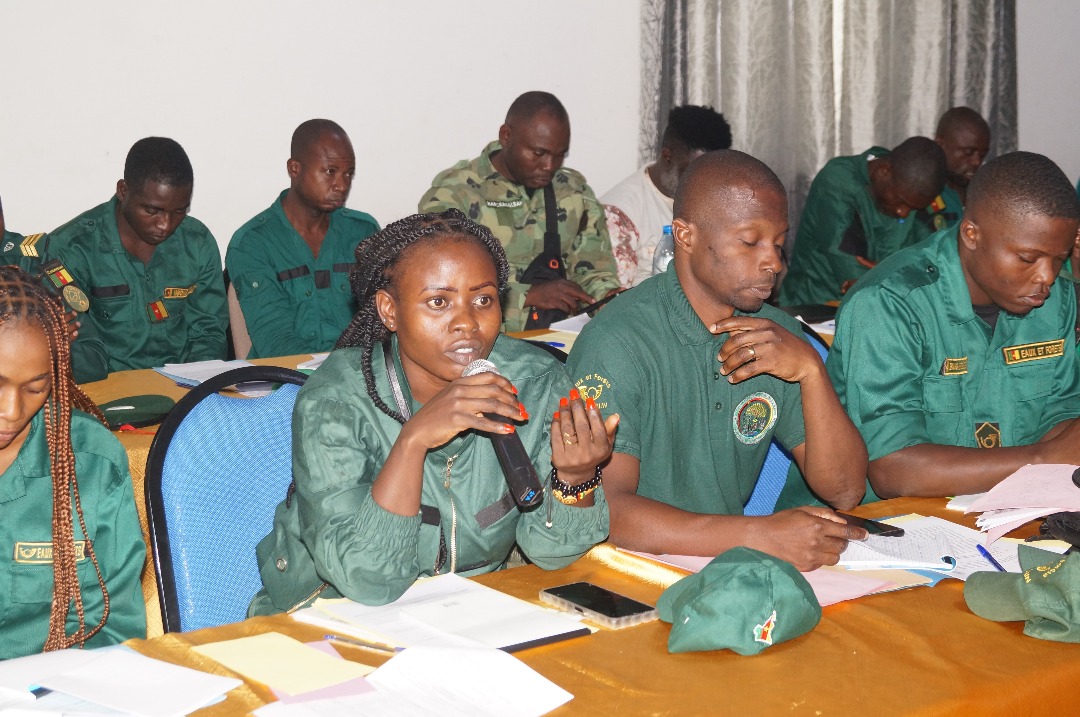By Leocadia Bongben
Eco-guards from the Boumba Bek and Nki National Parks in Southeast Cameroon can now handle cases of wildlife crimes and fight against poaching while upholding respect for human rights, following a three-day training in Bertoua from August 26 to 28.
These eco-guards learnt about the scale of wildlife crimes, legal instruments, and the system for punishing wildlife offences, some provisions of the new forestry and wildlife law: innovations and their legal and judicial implications, human rights and good practices in the fight against wildlife crime, and the WWF environmental and social safeguards framework.

The training serves as a measure of mitigation against abuses that may be observed during anti-poaching operations, undermining human rights and the rights of the indigenous people.
According to INTERPOL, organized criminal networks are involved in the lucrative illegal wildlife and wildlife product trade, which is valued at approximately €21 billion. The trade is one of the biggest direct risks to the survival of the most endangered species, besides habitat degradation. The huge demand for pangolin scales and elephant ivory from Asia, a weak legal and judicial system, corruption, a lack of legal knowledge among law enforcement, and influence peddling are some of the push factors for this trade.
Nonetheless, Cameroon is making some effort to combat the rise in poaching and the illicit wildlife trade. Following a 10-month monitoring of illegal activities in Boumba and Ngoko Division, East Region (September 2024 to June 2025), 11,599 wood species, 837,692 m³ of fuel, and other items were seized. Also, 10 camps belonging to poachers were destroyed, while two Russian-made hunting rifles, 21 bullets, and 4.5 rolls of cable were confiscated from poachers. Over 40 suspects (including 22 poachers and 19 illegal loggers) were arrested and arraigned before competent authorities.
To promote rational use of Cameroon’s natural resources, WWF is working with the Ministry of Forests and Wildlife (MINFOF) in supporting sustainable management of forest and wildlife resources and integrated protected area management in line with the MINFOF-WWF Memorandum of Understanding (MoU). Within this premise, the training of eco-guards in Boumba Bek and Nki is the continuation of the drive to instill respect for human rights in the fight against poaching and environmental crimes in protected areas.

According to Achile Mengamenya, Conservator of Nki National Park, “ecoguards inherited a poor perception from the population who think we brutalise them, the reason our anti-poaching missions are sometimes conflictual, with the aggression of ecoguards. A training like this, for ecoguards who have imbued human rights in their mission, is very important to enable them to constantly upgrade their capacity, ” the Conservator stated. He expressed the need to sensitize communities that ecoguards are not out to disturb them.
Calvin Fondja, Programme Manager WWF Jengi TRIDOM, states that WWF supports MINFOF in the management of protected areas, with a focus on maintaining their territorial integrity. Following this commitment, he says, “emphasis is on human rights because conservation can only be efficient when we respect the rights of indigenous people and the population around the protected areas who depend on the forest for their survival.”
‘Supporting the ministry for this training is to ensure that “eco-guards respect the rights of the communities while implementing the law, thereby reducing conflict and building trust,” Fondja adds.
“Conservation and human rights go hand in hand. This training is not only to build the technical capacities of eco-guards in anti-poaching procedures, but also to remind them to maintain high ethical standards in their work. Their role is not just to protect wildlife, but also to uphold human rights, reduce conflict with communities, and promote effective engagement against poaching,” Humphrey Ekane, Ethical Law Enforcement Coordinator at WWF Cameroon, said.
Aa part of a broader strategy to empower eco-guards to ensure effective fight against combat wildlife crime and uphold community rights, several initiatives have been taken including the adoption of a ten-year strategy (2020-2030) to combat poaching and wildlife crime in the country, the promulgation of the new Forest and Wildlife Law of July 24, 2024, the strengthening of partnerships between the various sectors (Forestry and Wildlife, Police, Gendarmerie, Customs, and Justice), and the adoption of the Code of Ethics and Professional Conduct for Forestry Staff Posted to Protected Areas of the National Territory.

